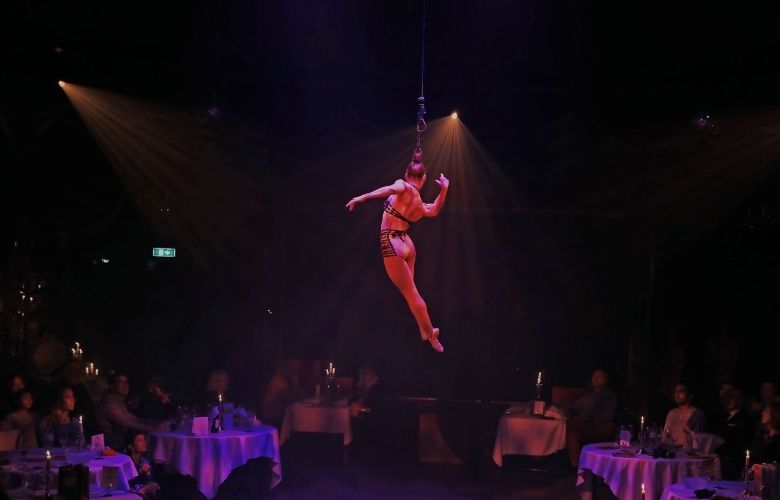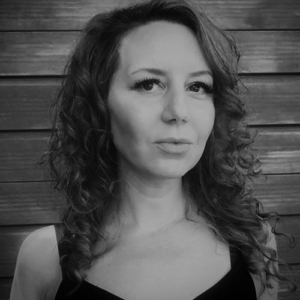
Danila Bim is a Brazilian circus artist who specialises in Aerial Hoop and Hair Suspension. She began her career in 1996 as a dancer at the Municipal Dance School of Ribeirão Pires, São Paulo before beginning circus training at the Theater Acting School of Santo André with Marcelo Milan at the age of 18. After performing two productions with the group, Danila ventured out to create her own material. Primarily self-taught, she has developed her work to a professional level and has performed with numerous circus companies including the famous Ringling Bros. and Barnum and Bailey Circus and Cirque du Soleil. Over the past 12 years, Danila has performed her acts in over 30 countries on 4 continents. In 2017, she premiered the original hair suspension act entitled Mirage in Cirque du Soleil’s touring show, Volta and currently resides in Los Angeles.
Hi Michelle, thanks for asking! Although the pandemic has caused a lot of pain and anxiety in the world, I’m managing to stay balanced when it comes to the present. After so many years of traveling, I have to say that having a moment to stop, regroup, and reorganise has been healthy, welcomed and longed for. Of course like a lot of artists without work, the uncertainty, worries and anxiety surrounding the question of when I will be able to perform again creeps in often. I just hope that it’s a feeling that will pass sooner than later!
Thank you. I started my career as a ballet dancer at 12 years old. Later at 18, I joined a circus group and learned new abilities that could help me progress as a dancer. As with many performers, over time, the circus became my home, it’s where my heart is. I started developing my own acts and performing wherever I could. Little by little this path took me to bigger and bigger stages.
After finishing my 7-year tour with Cirque du Soleil’s production Quidam, I decided to learn new things, by exploring different disciplines. The National Circus School of Brazil had a 2-month program for professional performers to expand their repertoire and skillsets. I applied and during this time I observed a few girls practicing hair suspension. It was something I had seen both in the world and through friends that practiced, but I never really paid it any mind.
I decided to give it a try because simultaneously I was learning to play the trombone and it seemed like a perfect combination; why not play the trombone while hanging by my hair!
Later I created an act and performed it in Cirque du Soleil’s production of Volta. There is no magic behind hair suspension. It truly is my scalp, my hair, and rope. I spend roughly 30 minutes tying a rope in a series of intricate knots that allow my scalp to bear my entire weight and frame. Does it hurt? Yes…. I like to compare it to life, it can hurt but not enough for me to stop doing it! On stage, however, I honestly feel nothing but joy.
Hair suspension has opened the door to those bigger stages for sure, so I would say as a performer it has been the highlight of my career thus far. The artistic freedom to perform a self-designed act allows more of the artist’s spirit to shine. The experience of performing with such a prestigious cast as Volta will also always be a very special memory to me.
To the second part of your question, as to why I love to perform, I would have to undoubtedly say it allows me to authentically be myself on stage- any version of myself I choose. To be vulnerable, bare of pretence and walls, to display my fears, passion, struggles, and joy with abandon is impossible to define. The ability for people to see themselves through me, be moved and inspired, is the best feeling I know.
I learned so much through the years. Circus is very demanding for any artist, and I would say the greatest learning curve I experienced involved my gymnastic skills. Being a dancer was natural but the precision that is necessary to achieve the certain performative goals I had, required I worked a lot harder on gymnastics. On the other hand, lacking those skills meant that I moved differently; my limitations forced me to explore unique artistic choices that made my work stand out at the time.
Train hard to be as strong and flexible as you can. Having a body that is prepared is important. But in the end, I believe that what touches people is how you connect with them. Circus goes way beyond physical abilities and breaking limits. We have gymnastics for that.
Find what makes you special and work to be the best version of that self.
The strongest version you can be. The fastest version. Create your own spin on whatever you do and make it in a way that only you can.
I founded a company called The Velvet Crane along with my husband, Wayne Wilson, and our colleague, Patrick Larsen. Together we wrote a show and venue concept titled RISE, and it is specially designed for the Covid era. We have partnered with the company Dragone and the Composers Showcase.
Over 100 professionals from the industry have donated their time and energy for the past 3 months to create a proof-of-concept 30-minute presentation.
Currently, we are looking for partners to help bring entertainment back to Las Vegas, safely. Part of our proceeds will go directly to The Entertainment Relief Fund, created by the Composers Showcase, to provide financial support to artists in Las Vegas currently struggling to make ends meet.
Links:

Accessibility At The Smith Center Series: Part One
The University of Wonder & Imagination: Cahoots NI Interactive Theatre Review


Michelle is a musician and composer from the UK. She has performed across the UK and Europe and is passionate about arts education and opportunities for women and girls.
Read Full Profile© 2021 TheatreArtLife. All rights reserved.

Thank you so much for reading, but you have now reached your free article limit for this month.
Our contributors are currently writing more articles for you to enjoy.
To keep reading, all you have to do is become a subscriber and then you can read unlimited articles anytime.
Your investment will help us continue to ignite connections across the globe in live entertainment and build this community for industry professionals.